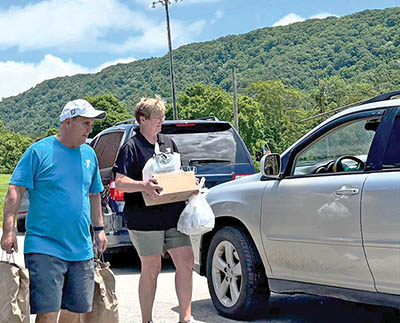YMCA provides 91,914 meals to 1,074 children

As part of the organization’s newly launched Summer Food Program, YMCA staff members and volunteers packed and delivered more than 9,000 meals each week for children across East Tennessee this summer, ensuring consistent breakfasts and lunches for every child participating in the initiative. Since May 31, the program provided 91,914 meals for 1,074 children.
“We know that food insecurity is a real struggle for many families, and that struggle intensifies in the summer,” explained Tonya Creed, the program’s director. “Kids that depend on school breakfast and lunch no longer have those options, and parents are then scrambling to feed three meals and snacks to kids all summer long.”
In rural communities such as Luttrell, Washburn and Rutledge, resources are especially limited, as it could take up to an hour just to reach a true grocery store. That’s why the Y stepped in to help fill these gaps, Creed said.
“We were packaging 14 meals each week — seven breakfasts and seven lunches, along with 14 cartons of milk per child,” she noted. “We then trucked these packages to our rural distribution sites at Luttrell Elementary, Rutledge Elementary and Washburn school. There was a designated pickup time each week at each location. Families would drive through the pickup line once a week and grab their bags of food, and then we’d see them again the next week!”
Creed said each day included an array of proteins, whole grains, fruits and vegetables. A weekly menu was offered to help families understand how to use different food items in exciting ways and which days to eat certain meals.
“It was important to us to offer healthy options, but at the same time we knew it had to be foods that kids were excited to eat,” she said.
Tortillas, pepperonis and cheese sticks, for example, could be used to make easy pizza roll ups. Kid-friendly staples such as whole grain cereal, low sugar jello, peanut butter and jelly sandwiches and muffins also were available, along with cherry tomatoes, apples, oranges, blueberries and mini cucumbers.
“Sometimes living far from a full grocery store, you’re depending on convenience stores and markets for most of your grocery shopping, so you may not have as many options for fresh produce,” Creed said. “Having shelf-stable meals that didn’t need refrigeration was a huge benefit.”
The whole point, she added, was to provide the basics needed to ensure children across our region are nourished, healthy and happy. As a result, anyone with children under the age of 18 was eligible to participate in the program.
“Our mission at the Y is ‘to put Christian principles into practice through programs that build a healthy spirit, mind and body for all,’” Creed said. “This was not based on income or need, as we wanted to help take away that stigma or that barrier for families.”
Richard Devin, who volunteered to help serve these families, said the response was overwhelming.
“Families were incredibly joyful and grateful,” he said. “Many returned week after week, and we enjoyed connecting with them. Some even brought their pets along, which added a friendly, community feeling.”
The experience also opened Devin’s eyes to the reality of living in rural East Tennessee.
“I realized how many barriers to food access often go unseen, such as a caregiver’s health or unreliable transportation,” he said. “The experience highlighted how challenging it can be for families to secure something as basic as consistent, nutritious meals.”
Sue Frazier, a member of the Davis Family YMCA who also volunteered with the program, agreed.
“The experience just reinforced things I have read and people I had talked to about how important it is to make sure our ‘neighbors’ have basic necessities like food,” she said. “While many of our churches and community organizations offer some of this assistance, it is much more difficult in rural areas to find these resources … This is a role that the public schools help with during the school year with free and reduced price breakfast and lunches, as it’s hard to concentrate and be productive if you are hungry or don’t have the basic living necessities.”
After a successful first year, the Summer Food Program, which was partially funded through a grant from No Kid Hungry, will continue serving the community next summer.
“We were overwhelmed with both the response from participants and the impact on these families,” Creed said. “We will be continuing this next summer and we hope to expand into additional rural communities in East Tennessee.”
Both Devin and Frazier plan to volunteer once again.
“This year’s success was due to the dedication of the coordinators, staff and volunteers. My role was small compared to theirs, and I hope to at least double my hours next summer,” Devin said. “The experience was exactly what I was looking for, and I feel fortunate to have been a part of it.”


